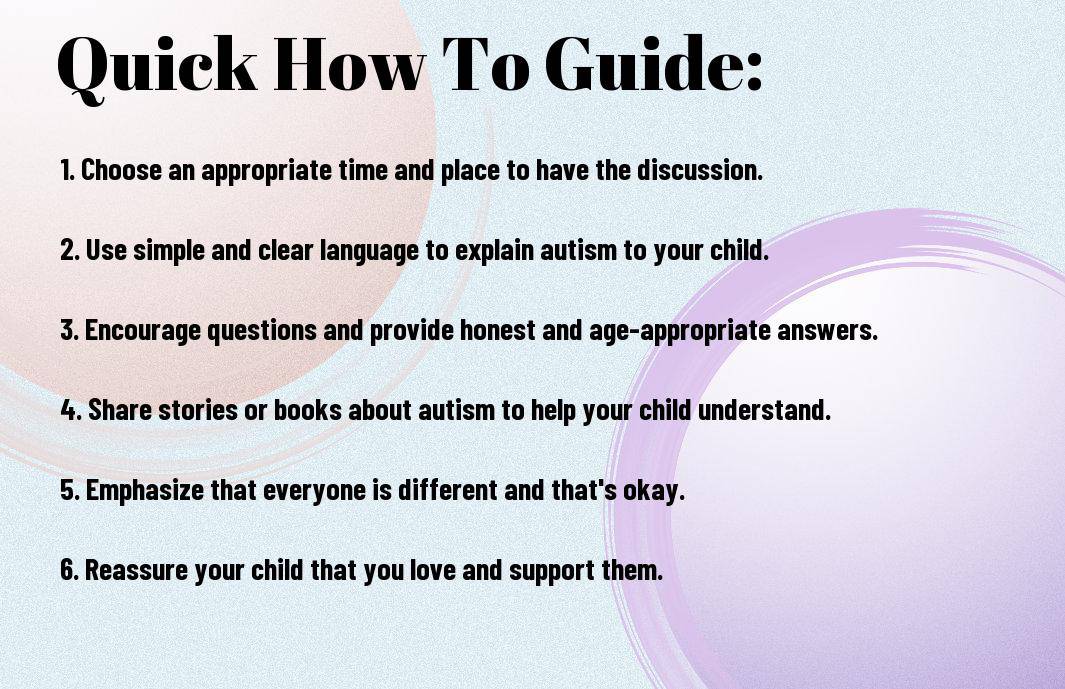Oftentimes, parents are apprehensive about discussing autism with their child. However, it is important to initiate this conversation at the right time and in the right way. Autism is a complex subject, and talking about it with your child can have a significant impact on their understanding and acceptance. In this how-to guide, we will explore the best approach to discussing autism with your child, including the appropriate age to begin the conversation and the effective communication strategies to use. By equipping yourself with the right knowledge and tools, you can create a supportive and safe environment for your child to learn about autism and embrace their unique experiences.
Key Takeaways:
- Timing is important: It is crucial to have age-appropriate discussions about autism with your child. Consider their level of understanding and maturity before initiating the conversation.
- Use clear and simple language: When discussing autism with your child, it’s important to use language that they can understand. Avoid using technical terms and instead focus on explaining in a clear and simple way.
- Encourage open communication: Create a supportive and safe environment for your child to ask questions and express their feelings about autism. Encourage open communication and reassure them that it’s okay to talk about their emotions and experiences.


Recognizing the Right Time
Discussing autism with your child is a delicate matter that requires careful consideration of the right time to broach the subject. Introducing Your Child to His or Her Diagnosis of Autism is a crucial step that must be timed appropriately to ensure the best possible outcome.
Developmental Considerations
When considering when to discuss autism with your child, it’s essential to take into account their developmental stage. Younger children may not have the cognitive ability to fully comprehend the diagnosis, while older children may be more ready to engage in open conversation about their condition.
Behavioural Cues and Changes
Observing your child’s behavioural cues and changes is key to identifying the right time to discuss autism with them. Look out for signs of confusion, frustration, or withdrawal, as these may indicate a need for greater understanding and support.
It’s important to note that some children may exhibit behavioural changes such as increased anxiety or social withdrawal when they become aware of their autism diagnosis. This is a crucial time to provide reassurance and support, and to address any negative emotions or misconceptions they may have.
Preparing for the Conversation
Before discussing autism with your child, it’s important to prepare yourself for the conversation. This means educating yourself about autism and anticipating the questions and reactions your child may have.
Educating Yourself about Autism
Take the time to research and understand what autism is. Familiarise yourself with the common symptoms, behaviours, and challenges faced by individuals with autism. This will help you to explain autism to your child in a clear and accurate way. Seek reliable sources of information such as reputable websites, books, or professionals in the field.
Understanding the complexities of autism will enable you to approach the conversation with confidence and knowledge. It will also help you to address any misconceptions or fears your child may have about autism.
Anticipating Questions and Reactions
Take some time to anticipate the questions or concerns your child may have about autism. Consider their age, maturity, and any previous exposure to the topic. Be prepared to provide clear and honest answers, and to support your child in processing their thoughts and feelings about autism.
By preparing for potential questions and reactions in advance, you can ensure that the conversation is productive and supportive for your child.

How to Approach the Discussion
When it comes to discussing autism with your child, it’s important to approach the conversation with care and consideration. This chapter will provide guidance on how to approach this sensitive topic in a supportive and understanding manner.
Choosing the Right Words and Tone
When discussing autism with your child, it’s essential to choose the right words and tone. Be mindful of the language you use and adopt a gentle, reassuring tone to convey your message. Avoid using negative or fear-inducing words, and instead, focus on emphasising their unique qualities and strengths.
Providing Reassurance and Support
Providing reassurance and support to your child during the discussion is crucial. Assure them that they are loved and supported, and that autism does not change how you feel about them. Encourage open communication and reassure them that they can ask questions and express their feelings freely.
It’s important to remind your child that they are not alone and that there are many people who understand and support them. Show empathy and understanding towards their emotions, and offer ongoing support as they navigate their feelings about their autism diagnosis.
Tips for Ongoing Communication
When it comes to discussing autism with your child, ongoing communication is key. Here are some tips for maintaining an open and supportive dialogue:
- Encourage open dialogue
- Utilize resources and support groups
- Seek professional guidance if needed
It’s important to keep the lines of communication open with your child, so they feel comfortable discussing their thoughts and feelings about autism.
Encouraging Open Dialogue
Encouraging open dialogue with your child is crucial for their understanding and acceptance of autism. Create a safe and non-judgmental space where your child feels comfortable expressing themselves. Be an attentive listener and validate their emotions, thoughts, and experiences related to their autism.
Utilizing Resources and Support Groups
Utilizing resources and support groups can provide invaluable help for both you and your child. Consider joining local autism support groups or seeking out online communities to connect with other parents and individuals who are also affected by autism. These groups can provide information, guidance, and a sense of community for you and your child.
Recognizing that you are not alone in this journey and that there are resources available can be comforting and empowering for both you and your child. Embracing the support of others who understand your autism-related challenges can make a significant difference in your overall experience.
Discussing Autism with Your Child – When and How to Do It
It is essential to approach the topic of autism with your child in a thoughtful and sensitive manner. As a parent, it is important to find the right time and the right words to explain autism to your child. It is crucial to create a safe and supportive environment for your child to ask questions and express their feelings. By having open and honest conversations, you can help your child understand their diagnosis and empower them to navigate their experiences effectively. For additional support and guidance on discussing autism with your child, you can also consider Sharing an Autism Diagnosis With Family and Friends. Remember, every child is unique, and your approach should be tailored to their individual needs and understanding.
FAQ
Q: When should I start discussing Autism with my child?
A: It’s important to start discussing Autism with your child at an early age, around 4-5 years old, when they start to develop an understanding of differences in people.
Q: How should I approach the topic of Autism with my child?
A: Approach the topic with patience and understanding. Use simple language and visual aids to help explain what Autism is and how it may affect them or others.
Q: What are some signs that my child may be ready to discuss Autism?
A: Signs include showing curiosity about differences, asking questions about behaviour or emotions, or showing empathy towards others.
Q: How can I help my child understand their own Autism diagnosis?
A: Be honest and open about their diagnosis, use positive language, and encourage them to ask questions. Emphasise their strengths and abilities, and reassure them that they are not alone.
Q: What are some common misconceptions about Autism that I should address with my child?
A: It’s important to address misconceptions such as all Autistic people being the same, or that Autism is a negative thing. Teach your child that everyone is unique and should be valued for their individuality.
Q: How can I support my child in their daily life as an Autistic individual?
A: Create a safe and supportive environment at home, teach coping strategies, and advocate for their needs in school and social settings. Encourage self-expression and celebrate their achievements.
Q: Where can I find additional resources and support for discussing Autism with my child?
A: There are many helpful books, online resources, and support groups available for both parents and children. Speak to your child’s school or healthcare provider for recommendations tailored to your child’s needs.







